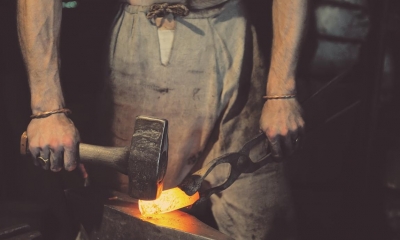
The following is an outline of some of the areas which may well be relevant to you.
What licences does a shopfitter need?
Although there are no licences relating specifically to shop fitting, it's possible that you will occasionally carry out some activities that are licensable.
Asbestos
If you intend to do any work involving asbestos (this might include removing old asbestos cladding sheets, for example) you may need a licence from the Health and Safety Executive (HSE) Asbestos Licensing Unit - or from the Health and Safety Executive Northern Ireland (HSENI). The cost of the licence is very high, and you may find that it's more economical for you to use a specialist firm whenever you encounter asbestos that needs removal. Even if you decide to always use a specialist contractor, it's a very good idea to familiarise yourself with your responsibilities under the regulations so that you know what you can safely do in a building should you come across any asbestos. The Shopfitting Independent Training Forum (SITF) operates a half day training course designed for people who need an understanding of asbestos and the potential risks.
Further details are available on the HSE, HSENI and SITF websites.
Building waste
If you are going to transport building waste (which is classified as a controlled waste), you will need a certificate of registration as an 'upper tier' waste carrier (just 'waste carrier' in Scotland). This is issued by the Environment Agency in England, Natural Resources Wales, the Northern Ireland Environment Agency, and the Scottish Environment Protection Agency (SEPA) in Scotland. It currently costs about £155 for the initial registration fee and a further renewal fee of about £105 every three years. Note that a single certificate of registration is issued to your business covering all of your waste transporting vehicles.
If you never transport this type of waste, you don't need to register as an upper tier waste carrier but bear in mind that you'll need to be registered as a 'lower tier' waste carrier ('professional collector or transporter of waste in Scotland) if you transport waste that isn't classified as building waste, for example off-cuts of carpet. Lower tier registration is free and lasts indefinitely.
Other licences and registrations
Skips placed on a public highway require a skip permit from the local authority. Certain conditions may be attached to the licence. Normally the skip hire company will arrange the necessary licences, but it is worth making certain of this.
Before erecting a scaffold on or over a public highway, you are obliged by law to obtain a permit from your local highway authority. Some local authorities also require you to obtain a scaffolding permit before putting up a scaffold in a public place. If you use a specialist scaffolder, they will often take responsibility for arranging any scaffolding permits needed. For more information, contact your local authority planning department or environmental health department.
If you pay sub-contractors for work done within the Construction Industry Scheme for taxation (CIS) then you must register as a contractor with HM Revenue & Customs (HMRC). More information is available on the HMRC section of the Gov.uk website.
As a shopfitting business engaging in various activities that are potentially hazardous to both your employees and to member of the public, there is certain legislation that you should be aware of.
Note that if your business is involved in activities such as gas installation, plumbing and electrical installation then there may be specific legislation and regulations which apply. Even if such activities are carried out by sub-contractors, you should take steps to ensure that they comply with all relevant legislation.
Building regulations
This is a general term for different pieces of legislation in England and Wales, Scotland and Northern Ireland. The work that you do must comply with local building regulations where applicable - your local authority building inspectorate will be able to give you more information. Information is also available on the Planning Portal and the Department of Finance Northern Ireland websites.
Environmental protection
The Environmental Protection Act and regulations made under it apply to the disposal of building and demolition waste. Special provision is made for hazardous waste products, for example old asbestos sheets.
The Gov.uk website includes guidance for business on environmental management.
Health & safety, fire
The Health and Safety at Work Act and the numerous regulations made under it cover all aspects of health and safety. Health and safety aspects of construction based activities are specifically covered by the Construction (Design and Management) Regulations and recent changes to these regulations have new implications for shopfitting businesses. The National Association of Shopfitters was involved in the consultation process for the new regulations and can provide assistance to members on how to adapt to the changes.
Some key areas where health and safety regulations affect your business, particularly if you employ staff, include:
- use of electrical equipment, such as power tools
- working at height (the Work at Height Regulations apply to both employers and self-employed workers)
- lifting of heavy items
- access to first aid equipment
- adequate provision and use of protective clothing and equipment (sawdust can be hazardous to health, for example, and respiratory protection should be used where appropriate)
- reporting of any accidents, near misses and injuries at work
You may also decide to participate in the PAS 82 Shopfitter scheme so that you can demonstrate that your business is compliant with good practice standards, including for health and safety.
You must comply with workplace health and safety and fire safety legislation.
Employment legislation
Anyone employing staff must comply with employment legislation. Important areas of legislation include:
Recruitment and employment contracts
Working time: hours, leave, flexible working
Maternity, paternity and adoption
Managing home workers, remote workers, lone workers
Helping your client to comply with legislation
When you are working on buildings such as shops that will be open to the public, there are certain legal issues that your design and workmanship should take into account. For example, you and your client should discuss issues such as disability access, fire regulations and other health and safety implications of the refurbishments that your business will be carrying out.
Sources of further Information
The National Association of Shopfitters offers a number of helpful publications to its members, including:
- the NAS Legal Guides for Shopfitters set, which includes guidance on contract matters, defects and defect clauses, adjudication, partnering, health and safety as well as various employment matters
- A Shopfitters Guide to the Construction (Design and Management) Regulations
- Manual Handling in the Shopfitting Industry
- Health and Safety in the Shopfitting Industry
The employing people section of the Gov.uk website includes information and guidance on all aspects of employment legislation. Information for businesses in Northern Ireland is available on the NI Business Info website.
Insurance for a shopfitter
When you start up in business you will need insurance cover. Contact an insurer and explain to him or her exactly how the business will operate - the insurer will then recommend what cover you should have.
The National Association of Shopfitters offers advice to its members about insurance matters and has put together a package of insurance benefits aimed specifically at the shopfitting industry.
Your insurance cover might include:
- premises, premises contents
- employer's liability
- public liability
- contractor's liability/contractor's all risks
- unfixed materials, plant and equipment on site
- combined property
- product liability, particularly if your business manufactures bespoke shopfitting items
- motor insurance (for business vehicles), possibly including cover for goods and equipment carried in your vehicles
- personal cover - accident and injury, loss of earnings and so on
- business interruption
When taking out personal and employer's liability cover it is particularly important to give precise details of the types of activity that you and any staff will be engaging in. Be prepared to answer questions about the height at which you will be working, the types of location where you will be working, the type of equipment you will be using, your health and safety policy and so on.
Business insurance policies for construction based businesses can be costly and it would be a good idea to get some quotes at an early stage in your planning. Shop around to obtain the best cover at the most affordable price.


